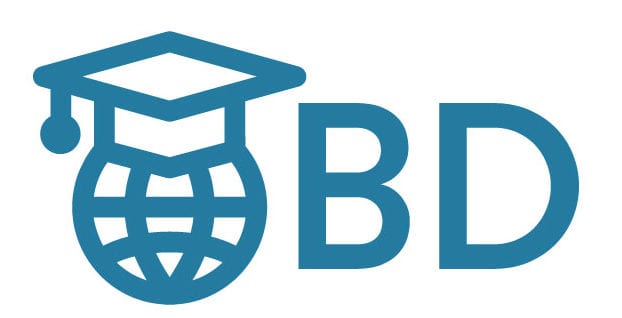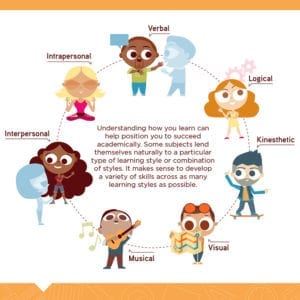What Type of Learner are You?
The 7 Major Styles of Learning
Learning style refers to the way students process, comprehend and retain knowledge. Most people have a dominant style, but use a few different styles situationally. There are seven major styles of learning:
- Verbal
- Logical
- Kinesthetic
- Visual
- Musical
- Interpersonal
- Intrapersonal
Understanding how you learn can help position you to succeed academically. Some subjects lend themselves naturally to a particular type of learning style or combination of styles. It makes sense to develop a variety of skills across as many learning styles as possible.
Verbal
Do you love adding to your vocabulary, word play, and participating in debates? You might be a verbal learner.
Verbal learners absorb knowledge best through words — both written and spoken. These learners prefer oral or written instructions vs. a chart or diagram.
Strengths:
- Written and verbal communication
- Listening
Weaknesses:
- Hand-eye coordination
- Spatial understanding
Best study techniques:
- Read, write and recite notes
- Participate in class discussions
College degrees to pursue:
- Linguistics
- Law
- Marketing
Logical
Do you dream in numbers, love brainteasers and thrive in structured environments? You might be a logical learner.
Logical learners like systems, mathematical processes and calculations. They enjoy using their powers of deduction and observation.
Strengths:
- Reasoning skills
- Problem-solving
Weaknesses:
- Communication skills
- Less comfortable with learning without structure
Best study techniques:
- Create lists of key points
- Write notes in your own words for better understanding
College degrees to pursue:
- Mathematics
- Computer science
- Business analytics
Kinesthetic
Do you gesticulate with your hands when talking, love sports and dislike sedentary activities? You might be a kinesthetic learner.
Kinesthetic or physical learners use their bodies in the learning process — they learn by doing. New subjects are best understood when a kinesthetic learner is actively engaged.
Strengths:
- Athletic
- Quick reactions
Weaknesses:
- Difficulty with concentration and focus during sedentary activities
- Spelling
Best study techniques:
- Hands on activities if possible
- Use case studies or real-life examples to help conceptualize information
College degrees to pursue:
- Physical therapy
- Theatre studies
- Construction management
Visual
Do you think in pictures, easily understand maps and prefer written directions to verbal ones? You might be a visual leaner.
Visual learners need images, diagrams, or charts to best absorb knowledge. They tend to create visual strategies and imagery for remembering information.
Strengths:
- Spatial understanding
- Excellent memory
Weaknesses:
- Listening skills
- Attention to detail
Best study techniques:
- Create charts, diagrams or mind maps to understand information
- Color code concepts when note-taking
College degrees to pursue:
- Engineering
- Architecture
- Graphic designer
Musical
Do you remember names not faces, talk to yourself often and make up songs to help remember information? You might be a musical learner.
Musical or aural learners prefer learning with sound and music. Hearing information is the best way for this type of learner to retain it.
Strengths:
- Musical ability
- Extroverted
Weaknesses:
- Difficulty concentrating in noisy environments
- Reading long sections of text
Best study techniques:
- Reciting notes aloud
- Create rhymes as memorization tool
College degrees to pursue:
- Music
- Sound engineering
- Foreign languages
Interpersonal
Do you thrive in group settings and learning from peers? Do people often come to you for advice? You might be an interpersonal learner.
Interpersonal or social learners prefer learning in groups or classes. They are highly communicative and enjoy interacting and discussing subjects with others.
Strengths:
- Encouraging and supportive of others
- Leadership qualities
Weaknesses:
- Difficulty working independently
- Maintaining concentration during study time
Best study techniques:
- Create or join study groups
- Role play situations
College degrees to pursue:
- Education
- Public administration
- Human resources
Intrapersonal
Do you get completely absorbed in tasks, enjoy spending time alone, and display a high degree of self-motivation? You might be an intrapersonal learner.
Intrapersonal or solitary learners are introspective and independent. They usually retreat to a quiet, solitary place for study and are often introverted.
Strengths:
- Concentration and focus
- Planning
Weaknesses:
- Public speaking
- Asking for help when faced with a difficult problem
Best study techniques:
- Independent study
- Document study habits to determine what works best
College degrees to pursue:
- Creative writing
- Entrepreneurship
- Software Engineering
Whatever your learning style, explore your educational options at online-bachelor-degrees.com!
SOURCES:
https://www.learningstyles.biz/
https://www.verywellmind.com/vark-learning-styles-2795156


